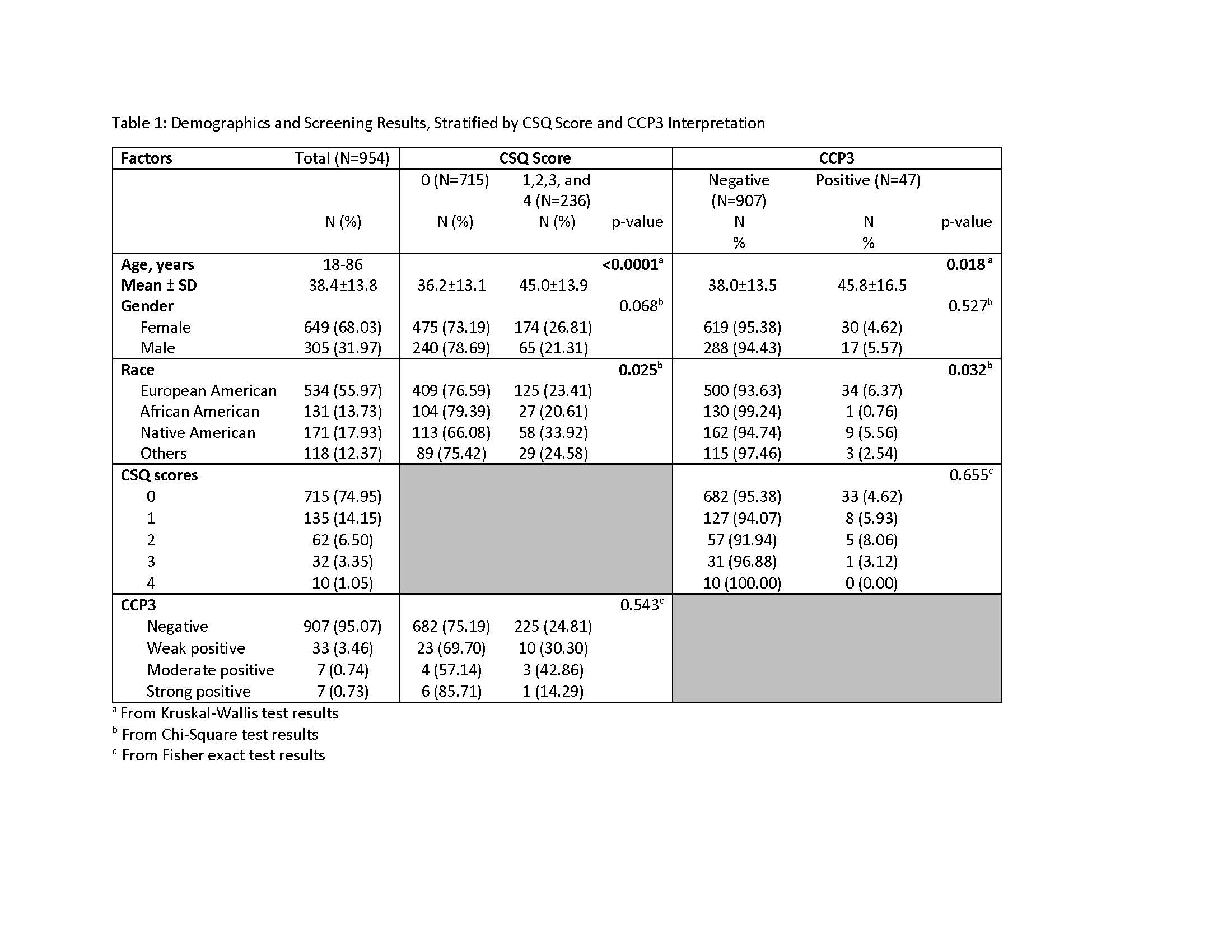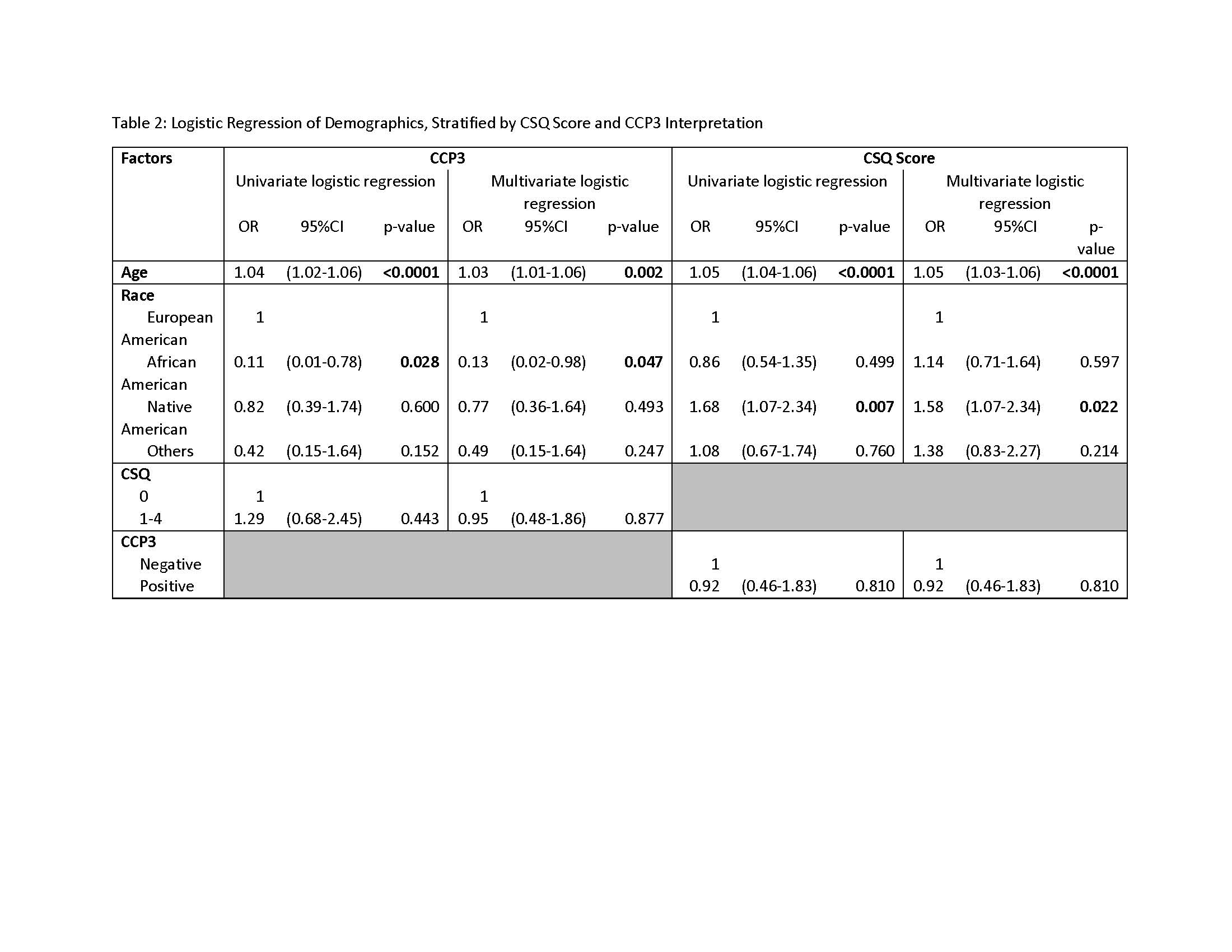Session Information
Date: Sunday, November 10, 2019
Title: RA – Diagnosis, Manifestations, & Outcomes Poster I: Risk Factors, Predictors, & Prognosis
Session Type: Poster Session (Sunday)
Session Time: 9:00AM-11:00AM
Background/Purpose: Anti-CCP antibodies are present in the serum of healthy individuals who are at risk of developing RA and serve as an important tool for diagnosing an individual with RA and providing prognostic information. The Connective Tissue Disease Screening Questionnaire (CSQ) is an assessment designed to help identify individuals who may be at risk for CTDs including RA, SLE, and SS. We hypothesize that healthy individuals with elevated levels of anti-CCP antibodies will have higher CSQ scores.
Methods: Demographic information (race, gender, and age) and CSQ scores were obtained from the datasets of 954 individuals who consented to be part of the Oklahoma Immune Cohort (OIC). These individuals were not diagnosed with RA or another autoimmune rheumatic disease. Anti-CCP3 levels were determined by ELISA. Individuals were identified as: < 20 EU/mL = negative, 20-39 EU/mL = weakly positive, 40-59 EU/mL= moderately positive, and ≥60EU/mL as strongly positive for anti-CCP3 antibodies. Associations between CSQ scores and age were determined by Kruskal-Wallis analysis and associations between CSQ scores, race, and gender were determined by Chi-square analysis. Logistical regression was used to determine the relationship between CSQ scores and anti-CCP3 levels while controlling for age, gender, and race.
Results: CSQ scores and anti-CCP3 levels were both found to be significantly different based upon age or race (Table 1). Healthy Native Americans were more likely to have elevated CSQ scores (OR=1.68) than healthy African Americans (OR=0.86) or heathy European Americans. African-American healthy individuals had the lower rate of anti-CCP3 responses. Logistic regression analysis, controlling for race, age and gender, showed that there were no significant associations between CSQ and anti-CCP3 levels (Table 2).
Conclusion: In this cohort of healthy adults, anti-CCP3 levels did not associate with variations in the CSQ score. However, anti-CCP3 levels and CSQ scores both varied with age and race, suggesting that these demographic factors may be relevant when screening for risk of developing rheumatic disease.
To cite this abstract in AMA style:
Muse M, Tran L, Guthridge C, Redinger N, James J. Assessment of Anti-Cyclic Citrullinated Protein and Connective Tissue Disease Screening Questionnaire in Healthy Adults from the Oklahoma Immune Cohort [abstract]. Arthritis Rheumatol. 2019; 71 (suppl 10). https://acrabstracts.org/abstract/assessment-of-anti-cyclic-citrullinated-protein-and-connective-tissue-disease-screening-questionnaire-in-healthy-adults-from-the-oklahoma-immune-cohort/. Accessed .« Back to 2019 ACR/ARP Annual Meeting
ACR Meeting Abstracts - https://acrabstracts.org/abstract/assessment-of-anti-cyclic-citrullinated-protein-and-connective-tissue-disease-screening-questionnaire-in-healthy-adults-from-the-oklahoma-immune-cohort/


